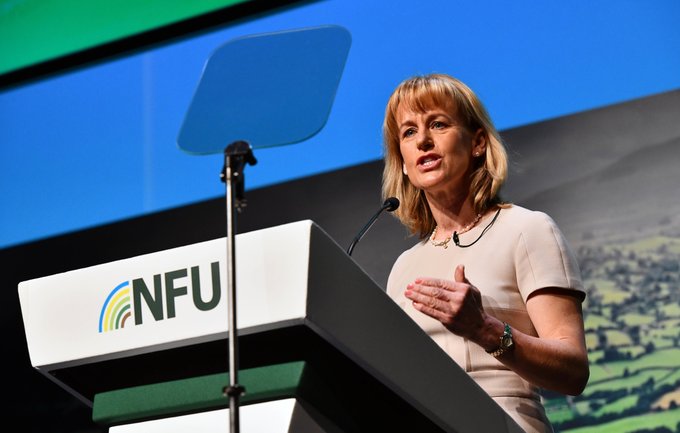
NFU President Minette Batters has expressed frustration at mixed messages coming out of government over food and farming standards.
There are growing fears in the farming industry that the government will be prepared to abandon food and welfare standards in order to secure trade agreements with the US and others.
The NFU president said any drop in standards would be "insane" when she addressed the union's annual conference in Birmingham today (25 February).
She said government was listening to the industry's arguments about standards, but she said mixed comments had been coming out of government for a long time.
"It is in the national interest of this country that we maintain our food standards, but it is complicated, it is technical," she said.
"I know that this will test the moral compass of some in government. There are going to have a to be some trade-offs and it would be a pipe dream to expect every country in the world to operate to the same rules and regulations."
But she said the prime minister and other government ministers needed to stand up for British values in trade talks.
“This isn’t just about chlorinated chicken. This is about a wider principle. We must not tie the hands of British farmers to the highest rung of the standards ladder while waving through food imports, which may not even reach the bottom rung," she added.
The NFU leader said that battery cage egg production was still permitted in some countries, although it was banned in the UK in 2012.
She also said that meat and bone meal in feed was banned in the UK 24 years ago, but was still allowed elsewhere.
In Brazil, farmers do not need a vet's prescription for animal medicines and did need to record treatments. There is no legislation in many parts of the world on the use of these drugs.
Mrs Batters said: “In the US and other countries there are no federal controls on what are deemed in the UK to be fundamental welfare requirements.
"And in Japan, Australia, China, Canada, Brazil, Malaysia and India the use of antibiotics is permitted for growth promotion," she said. "This isn't hysteria, this isn't mumbo jumbo; this is fact.
"To sign up to a trade deal that results in opening up our ports, shelves and fridges that would be illegal to produce here would not only be morally bankrupt - it would be the work of the insane."
She added: "This is about what's good for Britain. When the prime minister or any member of government is overseas discussing trade, our ask is that they start promoting British food and the values we hold dear about safety, quality and welfare."
Questioned by journalists following her speech, the NFU president explained that there was a difference in opinion on standards between government ministers.
She said that Theresa Villiers, who recently lost her job as Defra Secretary in Boris Johnson's cabinet reshuffle, had been adamant on BBC Country File that food imports must not undermine farmers in this country.
"It's about method of production, it's about the welfare legislation that we have here that other countries don't have. She has been very, very clear about what she calls maintaining EU laws in that area for the long term," Mrs Batters said.
But she said her successor as Secretary of State, George Eustice, had talked on the Marr Show of "there being a conversation to be had around those standards".
"Talk to others from the Department for International Trade and other departments who will say that they want to maintain our food values, our food standards," he said.
"You have to define what you want from the standards of imports."
The NFU president again called for government to establish expert commission comprising various experts to ensure that trade deals do not undermine British farming’s high environmental and animal welfare standards.
Last year former Environment Secretary Michael Gove had written to her to say he thought an expert commission was a good idea.
"He wrote to me, formally, and said, 'Yes, it must happen.'. I think Defra as a department absolutely think it is a good idea. But this has to travel right across government," she told conference delegates.
She won support for such a commission from CBI director general Dame Carolyn Fairbairn, who was also speaking at the conference.
"Standards encapsulate who we are as a country," she said. "They encapsulate what we believe on animal welfare, what we believe about labour standards, about environment. They actually are about who we are as a nation.
"I think we are just beginning to realise that but we need a really evidence based conversation about what kind of country we are and want to be. We are saying in our conversations with government, 'Create that proper framework for debate and discussion that we haven't had to have for 40 years.'
"So when you, Minette, talk about a need for an expert commission, we absolutely support the principle that lies behind that. Unless we have consumer groups and farmers and businesses working out what we believe about ourselves in terms of welfare, safety, environment, employment standards, we will not get the right kind of trade deal.
"So, standards feel as if they are dominating the conversation, and it is absolutely appropriate that they should."
